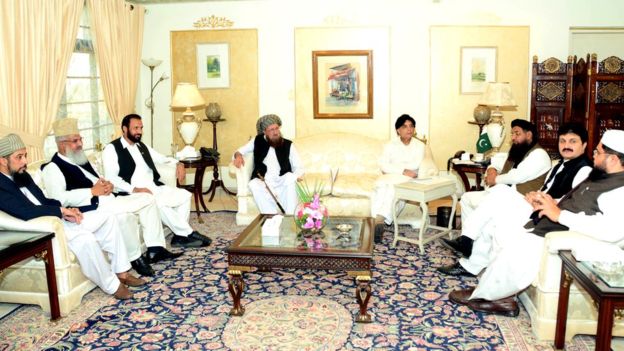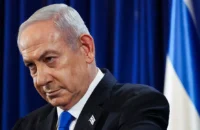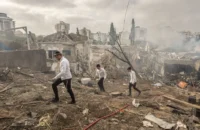A number of militant groups, including so-called “Islamic State” (IS), have claimed responsibility for the deadly attack on a police academy in the southwestern Pakistani city of Quetta. Masked gunmen stormed the facility late on Monday, taking hostages and killing at least 60 people, mostly cadets, and injuring some 117. Authorities say the death toll is likely to rise.
Quetta, the capital city of the restive Balochistan province, has been targeted by Islamists before. In August, a suicide bombing on a hospital in the city killed 73 people, many of them lawyers mourning a colleague who had been fatally shot. Both IS and a faction of the Pakistani Taliban claimed the attack.
The frequency with which militant attacks take place in Pakistan has angered the public. Many people now question the claims by the military that its ongoing operation against Islamists along the Afghan border has been a success. The army says it has killed 3,500 terrorists since the launch of the Zarb-e-Azb military campaign in June 2014.
The military has also used the pretext of combating terrorism to set up its own courts that now run parallel to the South Asian country’s civilian judicial system. The military courts have hanged hundreds of terrorists over the past year and a half, claiming that as a “huge blow” to the militant outfits.
The army has also made sure that Zarb-e-Azb receives massive media promotion. Consequently, from the tweets published by the military’s Inter-Services Public Relations (ISPR) to the army-funded patriotic songs and heaps of praise for the operation from many security analysts, the Pakistani people have been told that peace has been restored all across the country.
However, analysts say the latest attack has exposed major flaws in the military’s anti-terror strategy.
The Quetta attack once again showed that the military’s much-touted Zarb-e Azb operation and the National Action Plan to eradicate terrorism from Pakistani soil have been failures despite Pakistani army chief Raheel Sharif’s claims of victory,” Arif Jamal, a US-based expert on security and Islamism, told DW. “The terror infrastructure is intact in the country and the militants intensify their attacks on the Pakistani state whenever they want to,” he added.
Shifting blame
Once again, Pakistani authorities have blamed Afghanistan for the attacks.
Major General Sher Afgan, chief of the paramilitary forces in Balochistan which led the operation against the police academy attackers, said the militants “had been communicating with their handlers in Afghanistan.” Afgan said communication intercepts showed the terrorists belonged to Lashkar-i-Jhangvi’s Al-Alimi faction, which is affiliated with the Tehreek-i-Taliban Pakistan (TTP). The group itself, however, has not claimed the attack.
Faiz Mohammad Zaland, a lecturer at Kabul University, says Islamabad should stop this “blame game.”
“Islamabad is blaming Kabul for its own failures. It continues to point fingers at Afghanistan for the terrorist attacks that take place on Pakistani soil,” Zaland told DW.
“By blaming Kabul, the Pakistani military and intelligence agencies are keeping its civilian government in the dark. As a result, Prime Minister Nawaz Sharif cannot tackle these problems effectively.”
Analyst Jamal, too, believes Pakistani officials are trying to shift blame on Kabul and are reluctant to take responsibility for the security failures. They continue to pursue the policy of differentiating between “good” and “bad” terrorists, he says.
“The Pakistani Army never targets Islamic terrorists whom they need for a ‘jihad’ in India-administered Kashmir and Afghanistan. Also, the military leadership has been busy in ‘witch-hunting’ of politicians, which means their focus is wrong,” Jamal underlined.
A statement by IS?
On August 8, a suicide bomber killed 77 people, mostly lawyers, in an attack in Quetta. The attack was claimed by both the Taliban as well as IS.
At that time, the government officially acknowledged that IS was trying to make inroads into Pakistan.
“They [IS] tried to [sneak] into Pakistan but failed and [were] apprehended,” military spokesman Asim Bajwa told reporters in August.
He said major IS attacks on prominent targets, including the Ministry of Foreign Affairs, foreign embassies, consulates and their staff, Islamabad airport, key public figures, media persons and law enforcement personnel, had been averted.
“The IS ideology finds resonance in Pakistan. There are many religious groups that openly endorse it; however, they are quite small in size. But I fear that IS could still count on their backing,” Peshawar-based expert Iqbal Khattak told DW.
Khattak says that military operations alone won’t solve the problem. “It is extremely important for the Pakistani state to invest in the welfare of common people and launch development programs to eradicate poverty and discourage people from joining the ranks of extremist outfits,” he said. “Until then, anything is possible in Pakistan and Afghanistan,” he added.
The civil-military spat
Experts also say that the ongoing tussle between the civilian leadership and the army is having a negative impact on Pakistan’s battle against extremists. Also, the military is cracking down on liberal political parties instead of targeting Islamists.
The weakening of mainstream political parties is creating a lot of space for jihadist groups in Pakistan. Because of the active military interference in political matters and conspiracies, no civilian government has been able to perform and show results since 1988,” Jamal said.
“The irony is that terrorist organizations such as Jamatud Dawa are openly recruiting and fundraising in Pakistan while the army is accusing politicians of funding terrorism.
“We now discover that the Zarb-e-Azb military operation is aimed at weakening political parties and not eliminating terrorists. Some of the top global terrorists such as Hafiz Saeed and Hizbul Mujahideen’s Yusuf Shah are openly leading public rallies, recruiting jihadists and fundraising,” he added.
After the Quetta attack, Pakistan’s Interior Minister Chaudhry Nisar Ali Khan said the war against militants was not over yet. “The enemy is weakened, but not eliminated,” he told media in Quetta.
But experts say that the militancy issue will not be resolved in Pakistan if the authorities do not realize the gravity of the issue and act against all militants across the board.



























